In the world of poker, where every hand dealt offers a new challenge and opportunity, we find ourselves constantly seeking the edge that will turn the odds in our favor. Mastering the art of poker strategy is not just about understanding the rules or memorizing odds; it involves delving into the psychology of our opponents, refining our instincts, and making calculated decisions under pressure.
As passionate players, we know that consistent wins are born from a blend of:
- Skill
- Patience
- Insight
Together, we embark on this journey to enhance our strategic prowess, learning from both our victories and defeats. By analyzing game theory, honing our bluffing techniques, and managing our bankrolls wisely, we aim to transform our approach to the game.
Join us as we explore the nuances of poker strategy, sharing tips and insights that will empower us to become formidable opponents at any table.
Understanding Game Theory
Game theory provides a mathematical framework to analyze strategic decision-making in poker. By applying these principles, we can enhance our poker strategy and make decisions that are not just reactive but proactive. Understanding game theory is a crucial step for those who aspire to consistently outwit their opponents.
We have the ability to evaluate various scenarios on the poker table by:
- Weighing potential outcomes
- Adjusting our moves accordingly
This isn’t just about knowing the odds; it’s about anticipating the moves of others and positioning ourselves advantageously. Each hand we play becomes an opportunity to refine our strategy, contributing to a shared journey of growth and mastery.
Together, we can explore how to implement game theory in our poker strategies by:
- Creating a sense of community among those eager to elevate their game.
- Embracing this mathematical approach to ensure we’re always one step ahead.
Let’s commit to this journey and enhance our abilities, both individually and collectively.
Analyzing Opponents’ Behavior
To consistently win at poker, we must keenly observe and interpret our opponents’ behaviors to anticipate their next moves. Understanding the nuances of body language, betting patterns, and emotional tells is crucial in the world of poker strategy.
When we sit at the table, we become part of a community, all striving for victory through skillful play. By analyzing the frequency and manner of our opponents’ bets, we can gauge their confidence and hand strength.
Key observations to make include:
- Do they raise aggressively or hesitate before folding?
- How do they react when they win or lose a hand?
Each action provides a clue. Some players might display frustration, while others remain stoic. Recognizing these signs helps us tailor our strategy to exploit their weaknesses.
We should also consider the table dynamics and how our opponents interact with one another. By immersing ourselves in understanding these behaviors, we strengthen our collective poker strategy, enhancing our chances of success together.
Developing Bluffing Techniques
Mastering the art of bluffing requires skillful manipulation of perceptions and sowing doubt in opponents’ minds. As a unified group of aspiring poker strategists, we thrive on camaraderie and understanding. Bluffing isn’t just about deception; it’s about reading the table’s energy and knowing when to seize the moment.
Our poker strategy hinges on the delicate balance of aggression and subtlety. Together, we can elevate our game by honing these skills.
In our shared journey, we must recognize the importance of timing and adaptability. A well-timed bluff can turn the tide in our favor, but we must also be ready to adjust our tactics based on opponents’ responses.
Let’s focus on building a repertoire of bluffs, ensuring we’re unpredictable and keeping our opponents off-kilter. Our strategies should include:
- Bold bluffs
- Understated bluffs
Together, we’ll foster an environment where each of us feels empowered to experiment and refine our techniques, strengthening our poker community.
Managing Bankroll Wisely
Effectively managing our bankroll is crucial for sustaining long-term success and minimizing financial risk at the poker table.
Establish a Dedicated Bankroll:
- Separate your poker bankroll from personal finances.
- Prepare for the inevitable ups and downs of the game.
Set Limits:
- Determine how much you’re willing to risk per session.
- Protect yourself from impulsive decisions driven by temporary emotions.
Community and Shared Experiences:
- By following a disciplined approach to bankroll management, you secure your stability.
- Inspire others by demonstrating effective bankroll management.
- Cultivate a supportive environment where everyone can grow and succeed.
Mindful of Stakes:
- Choose games that align with your bankroll size.
- Reduce stress and maintain confidence in your poker strategy.
Let’s make wise choices, support each other, and enjoy the journey toward consistent wins.
Improving Decision-Making Skills
Enhancing our decision-making skills at the poker table involves understanding probabilities, reading opponents, and managing emotions effectively. Together, we can sharpen these skills to elevate our poker strategy.
Understanding Probabilities
By familiarizing ourselves with the odds of various hands and potential outcomes, we can make more informed choices. This shared knowledge strengthens our community, as we learn and grow together.
Managing Emotions
Managing our emotions is crucial. We’ve all felt the heat of a bad beat or the thrill of a winning streak, but maintaining composure is key. By supporting one another, we ensure that emotional control becomes a cornerstone of our poker strategy. This bond empowers us, allowing us to remain calm and make rational decisions even under pressure.
Reading Opponents
While reading opponents is vital, we’ll focus on it later.
For now, by honing our decision-making skills with a focus on:
- Probabilities
- Emotions
We build a solid foundation to consistently improve and succeed together.
Enhancing Reading Abilities
Understanding our opponents’ tells and betting patterns provides us with a strategic edge at the poker table. As a community of poker enthusiasts, we know that reading abilities aren’t just about seeing what’s on the surface. They’re about digging deeper and connecting with the subtle cues that others might miss. By deciphering these signals, we align ourselves more closely with the essence of a winning poker strategy.
Key Tells to Observe:
-
Physical cues: Moments when a player’s hand trembles or their voice shifts slightly. These are windows into their thought process, revealing anxieties or confidence.
-
Betting patterns:
- A consistent raise could hint at strength.
- Hesitance might indicate uncertainty.
By sharpening our reading abilities, we collectively elevate our game, fostering a sense of camaraderie and shared success.
Together, we can create an environment where understanding and intuition thrive, making our poker strategy not just a personal journey, but a collective triumph.
Practicing Patience and Discipline
Mastering patience and discipline is crucial for making smart decisions and avoiding impulsive moves at the poker table. When playing, it’s easy to get caught up in the excitement and let emotions dictate actions. However, a solid poker strategy demands maintaining composure, even when the stakes are high.
By doing so, we strengthen our sense of community within the poker world, as seasoned players recognize the value of steadiness and self-control.
Practicing patience involves:
- Waiting for the right hands
- Not forcing plays
- Understanding that not every hand is worth pursuing
- Recognizing that sometimes folding is the wisest move
Discipline involves:
- Sticking to our strategy
- Not deviating due to momentary whims
- Resisting the pressure of peers
Together, these qualities help build a reputation as thoughtful, strategic players.
As we embrace patience and discipline, we align ourselves with a shared goal of consistent success.
Embracing Continuous Learning
Continuous learning is essential for staying ahead in poker and adapting to the ever-evolving dynamics of the game. As a community of players who thrive on challenge and growth, we understand that poker strategy isn’t just about memorizing rules; it’s about embracing change and constantly refining our skills. By actively seeking new knowledge, we can sharpen our instincts and make more informed decisions at the table.
Together, we engage in activities that foster growth and shared insights:
- Dive into books
- Attend workshops
- Watch expert tutorials
This collective effort creates an environment where our shared insights elevate us all. We discuss hands, analyze outcomes, and learn from each other’s experiences, building a collective wisdom that strengthens our strategies.
Our commitment to learning ensures we’re not just playing the game but mastering it. Every game offers a lesson, and every mistake is an opportunity for growth. As we embrace this journey of continuous learning, we solidify our place within the poker community, united by our dedication to excellence.
What are the best physical and mental exercises to prepare for a long poker tournament?
To prepare for a long poker tournament, a balanced routine of physical and mental exercises is essential.
Physical Exercises:
- Cardio for Endurance: Engaging in regular aerobic activities like running, cycling, or swimming to build stamina.
- Strength Training for Focus: Incorporating weight lifting or resistance exercises to improve concentration and mental resilience.
Mental Exercises:
- Mindfulness Practices: Integrating meditation or yoga into your routine to enhance mental clarity and reduce stress.
Additional Preparation Strategies:
-
Stay Hydrated: Ensure consistent water intake to maintain focus and energy levels.
-
Eat Nutritious Foods: Consume a balanced diet rich in proteins, healthy fats, and complex carbohydrates to fuel your body and mind.
-
Get Plenty of Rest: Prioritize sleep to allow your body and brain to recover and perform optimally.
By integrating these strategies into your preparation, you can optimize performance and increase your chances of success in the tournament.
How do professional poker players maintain focus during long sessions?
Staying Focused During Long Poker Sessions
To maintain focus during extended poker sessions, we adopt several key practices:
- Taking Breaks: Regular intervals away from the table help refresh our minds.
- Staying Hydrated: Drinking water consistently keeps us physically and mentally alert.
- Practicing Mindfulness: Mindfulness techniques ensure mental clarity and enhance decision-making at the table.
Setting Goals
- Specific Goals for Each Session: Clearly defined objectives provide motivation and keep us on track.
Prioritizing Self-Care
By prioritizing self-care and staying disciplined, we significantly reduce the risk of our attention wavering. This approach gives us the best chance for success in the game.
What are some effective stress management techniques for poker players?
Managing Stress at the Poker Table
When stress hits at the poker table, there are several strategies we can employ to maintain composure and enhance our performance:
-
Deep Breaths: Taking deep breaths helps us stay calm and focused.
-
Visualization: We practice visualization to see success in our minds, which boosts confidence and positivity.
-
Physical Breaks:
- Taking breaks allows us to reset.
- Stretching helps relieve tension and improve circulation.
-
Social Support:
- Connecting with fellow players provides emotional support.
- Sharing experiences and tips can be reassuring.
-
Laughter:
- Laughter is known to be an effective stress reliever.
- It reminds us not to take ourselves too seriously.
Mindset Maintenance
We remind ourselves that it’s just a game and that we’re in control of our emotions. By keeping perspective, we can enjoy the experience and make better decisions.
Conclusion
Congratulations on taking steps to master the art of poker strategy! By focusing on several key aspects, you’re well on your way to consistent wins.
Key Strategies to Master:
-
Game Theory: Understand the mathematical foundations of poker to make optimal decisions.
-
Opponent Analysis: Learn to read your opponents’ behaviors and tendencies to gain an edge.
-
Bluffing Techniques: Hone your ability to deceive and manipulate the table dynamics effectively.
Essential Habits:
-
Bankroll Management: Always manage your funds wisely to sustain long-term play.
-
Decision-Making Skills: Continuously improve your ability to make sound choices under pressure.
-
Patience and Discipline: Cultivate these virtues to maintain composure and make strategic plays.
Continuous Improvement:
-
Reading Abilities: Enhance your ability to interpret the game’s flow and opponents’ strategies.
-
Lifelong Learning: Stay committed to learning and adapting to new strategies and trends.
With dedication and perseverance, you’ll become a formidable poker player who can outsmart and outplay the competition. Good luck at the tables!



